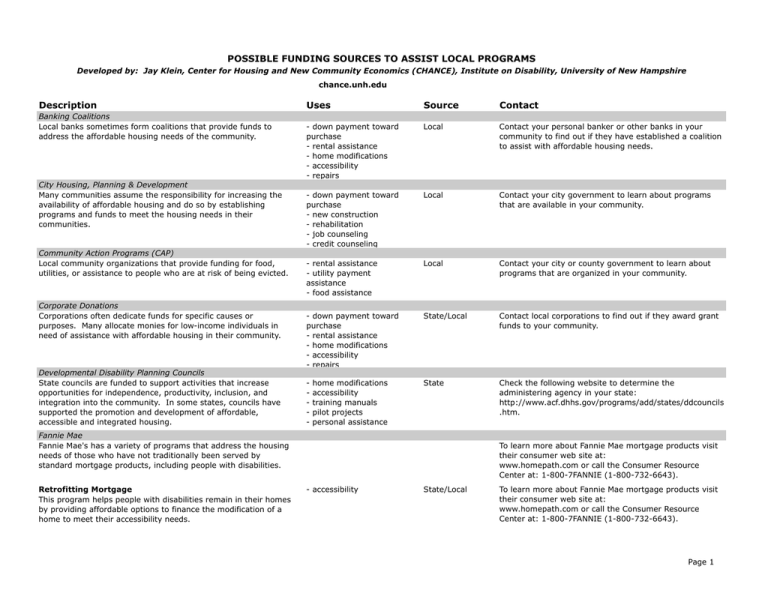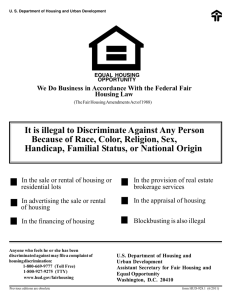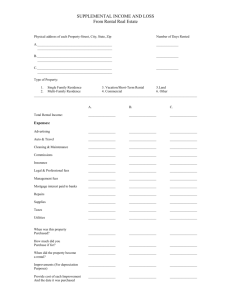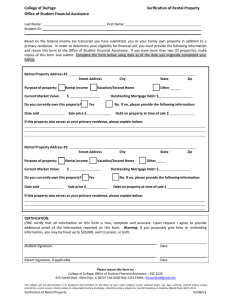POSSIBLE FUNDING SOURCES TO ASSIST LOCAL PROGRAMS
advertisement

POSSIBLE FUNDING SOURCES TO ASSIST LOCAL PROGRAMS Developed by: Jay Klein, Center for Housing and New Community Economics (CHANCE), Institute on Disability, University of New Hampshire chance.unh.edu Description Banking Coalitions Local banks sometimes form coalitions that provide funds to address the affordable housing needs of the community. City Housing, Planning & Development Many communities assume the responsibility for increasing the availability of affordable housing and do so by establishing programs and funds to meet the housing needs in their communities. Community Action Programs (CAP) Local community organizations that provide funding for food, utilities, or assistance to people who are at risk of being evicted. Corporate Donations Corporations often dedicate funds for specific causes or purposes. Many allocate monies for low-income individuals in need of assistance with affordable housing in their community. Developmental Disability Planning Councils State councils are funded to support activities that increase opportunities for independence, productivity, inclusion, and integration into the community. In some states, councils have supported the promotion and development of affordable, accessible and integrated housing. Uses Source Contact - down payment toward purchase - rental assistance - home modifications - accessibility - repairs Local Contact your personal banker or other banks in your community to find out if they have established a coalition to assist with affordable housing needs. - down payment toward purchase - new construction - rehabilitation - job counseling - credit counseling Local Contact your city government to learn about programs that are available in your community. - rental assistance - utility payment assistance - food assistance Local Contact your city or county government to learn about programs that are organized in your community. - down payment toward purchase - rental assistance - home modifications - accessibility - repairs State/Local Contact local corporations to find out if they award grant funds to your community. - State Check the following website to determine the administering agency in your state: http://www.acf.dhhs.gov/programs/add/states/ddcouncils .htm. home modifications accessibility training manuals pilot projects personal assistance Fannie Mae Fannie Mae's has a variety of programs that address the housing needs of those who have not traditionally been served by standard mortgage products, including people with disabilities. Retrofitting Mortgage This program helps people with disabilities remain in their homes by providing affordable options to finance the modification of a home to meet their accessibility needs. To learn more about Fannie Mae mortgage products visit their consumer web site at: www.homepath.com or call the Consumer Resource Center at: 1-800-7FANNIE (1-800-732-6643). - accessibility modifications State/Local To learn more about Fannie Mae mortgage products visit their consumer web site at: www.homepath.com or call the Consumer Resource Center at: 1-800-7FANNIE (1-800-732-6643). Page 1 POSSIBLE FUNDING SOURCES TO ASSIST LOCAL PROGRAMS Developed by: Jay Klein, Center for Housing and New Community Economics (CHANCE), Institute on Disability, University of New Hampshire chance.unh.edu Description Uses Source Contact - purchase owneroccupied, principal residences, including units in approved condominiums and planned housing developments. State/Local To learn more about Fannie Mae mortgage products visit their consumer web site at: www.homepath.com or call the Consumer Resource Center at: 1-800-7FANNIE (1-800-732-6643). Community Home Buyer's Program This is a 5% low-down payment mortgage. When combined with a special optional mortgage product, the income limit can be removed if the borrower purchases a home in a designated central city or an eligible minority or low-income housing tract. - purchase owneroccupied, principal residence State/Local To learn more about Fannie Mae mortgage products visit their consumer web site at: www.homepath.com or call the Consumer Resource Center at: 1-800-7FANNIE (1-800-732-6643). Fannie 97 This program requires only a 3 percent down payment, and is ideal for a potential home buyer who has enough income to handle monthly mortgage payments, but has difficulty accumulating cash for the down payment. - purchase owneroccupied, principal residence State/Local To learn more about Fannie Mae mortgage products visit their consumer web site at: www.homepath.com or call the Consumer Resource Center at: 1-800-7FANNIE (1-800-732-6643). Fannie 3/2 This program makes it easier for low- and moderate-income borrowers to obtain this mortgage product's required 5% down payment by requiring that only 3% of the down payment come from the borrower's own funds. The other 2% may come from other eligible sources. - purchase owneroccupied, principal residence State/Local To learn more about Fannie Mae mortgage products visit their consumer web site at: www.homepath.com or call the Consumer Resource Center at: 1-800-7FANNIE (1-800-732-6643). Fannie Mae (Continued) HomeChoice Mortgages available to qualified low- and moderate-income individuals who have disabilities or live with family members with disabilities. Federal Home Loan Banks The FHLBank System consists of 12 regional FHLBanks, a fiscal agent, and the Office of Finance and is the single largest supplier of home mortgage credit in the United States To view the programs, the banks, and the states they cover go to: http://www.fhfb.gov/FHLB/FHLBS_banks.htm. Affordable Housing Program (AHP) The AHP subsidizes the cost of housing for very low-income and low- or moderate-income owner-occupied and rental housing that must be used to fund the purchase, construction or rehabilitation or refinancing of owner-occupied housing or rental housing. - owner-occupied housing - rental housing State/Local To view the programs, the banks, and the states they cover go to: http://www.fhfb.gov/FHLB/FHLBS_banks.htm. Community Investment Program (CIP) The CIP is a lending program in which member banks borrow money, at a discounted rate of interest, to fund the purchase, construction, rehabilitation, refinancing, or predevelopment financing of qualified housing. - owner-occupied housing - rental housing - manufactured housing State/Local To view the programs, the banks, and the states they cover go to: http://www.fhfb.gov/FHLB/FHLBS_banks.htm. Page 2 POSSIBLE FUNDING SOURCES TO ASSIST LOCAL PROGRAMS Developed by: Jay Klein, Center for Housing and New Community Economics (CHANCE), Institute on Disability, University of New Hampshire chance.unh.edu Description Uses Source Contact - community resource development - workforce development - economic development - homeownership - rental assistance - accessibility - repairs Local Check foundations in your area at: www.communityfoundationlocator.org Developed by: Council on Foundations 1828 Second Street Washington, DC 20036 (202) 466-6512 (voice) (202) 785-2936 (fax) - community resource development - workforce development - economic development State/Local Ford Foundation (Headquarters) 320 East 43rd Street New York, NY 10017 USA (212) 573-5000 (voice) (212) 351-3677 (fax) www.fordfound.org (website) - homeownership rental assistance home modifications accessibility repairs State/Local The Home Depot Foundation 2455 Paces Ferry Road Atlanta, GA 30339 (866) 593-7019 (toll free voice) (866) 593-7027 (toll free fax) www.homedepotfoundation.org (website) Housing Trusts Dedicated capital pool established by legislation, ordinance, or resolution to receive specific on-going revenues from sources such as taxes, fees, or loan repayments that supplies funding for affordable housing. - rental assistance home modifications accessibility repairs State/Local Contact your state, county, or city government, or public housing agency to find out if there are housing trusts in your area. HUD Funds HOME Investments Partnerships Program (HOME) The program was created to help expand the supply of decent, affordable housing for low and very low-income families by providing grants to States and local governments. HOME's flexibility empowers communities to design and implement strategies tailored to their own needs and priorities. - build or renovate rental housing - finance homeownership - repair homes, including accessibility - rental assistance State/Local To determine what programs are available in your community or to contact your local representative visit: www.hud.gov/offices/cpd/affordablehousing/programs/ho me/contacts/index2.cfm. Foundations (Local) Many foundations award funds to specific geographic areas to promote affordable housing and community development. Foundations (National) Ford Foundation The Ford Foundation's goals are to: strengthen democratic values, reduce poverty and injustice, promote international cooperation and advance human achievement. Home Depot Foundation Supports organizations that work to create and rehabilitate affordable housing making the dream of home ownership a reality for many people. Examples of organizations supported include: Habitat for Humanity affiliates, Rebuilding Together affiliates, Development Corporations, and Neighborhood Housing Initiatives. Page 3 POSSIBLE FUNDING SOURCES TO ASSIST LOCAL PROGRAMS Developed by: Jay Klein, Center for Housing and New Community Economics (CHANCE), Institute on Disability, University of New Hampshire chance.unh.edu Description HUD Funds (continued) Self-Help Ownership Opportunity Program (SHOP) Funds are provided to eligible non-profit organizations to assist in the purchase of home sites that are developed or improved with sweat equity and volunteering based on the principals of this homeownership program for low-income persons and families. Emergency Shelter Grant (ESG) This program was created to help states and local communities meet the basic shelter and supportive services needs of homeless people in the area. Supportive Housing Program (SHP) The Supportive Housing Program is designed to promote the development of supportive housing and supportive services to assist homeless persons in the transition from homelessness and to enable them to live as independently as possible. Community Development Block Grants (CDBG) This program was created to develop viable communities by providing decent housing and suitable living environment by expanding economic opportunities, principally for persons of lowand moderate-income levels. Housing Opportunities for People with AIDS (HOPWA) Program addresses the needs of persons with AIDS and their families and provides housing assistance. Uses Source Contact - land acquisitions - infrastructure improvements State/Local For more information or a list of current grantees visit: www.hud.gov/offices/cpd/affordablehousing/programs/sh op/index.cfm or call 202-708-2684 or 1-800-877-8339 for the hearing impaired. - renovation, major rehabilitation, and conversion - essential services such as housing counseling, employment, mental health, substance abuse, education - homeless prevention activities - acquisition, rehabilitation, and conversion - new construction - supportive services - operating costs - leasing costs - administrative expenses - rental housing - homeownership activities - homeowner repair - public services - accessibility modifications - tenant-based rental assistance - short-term payments to prevent homelessness - rental assistance and related supportive services State/Local For more information about this program in your community visit: www.hud.gov/local/index.cfm. State/Local For more information about this program in your community visit: www.hud.gov/local/index.cfm. State/Local For more information about this program in your community visit: www.hud.gov/offices/cpd/community development/programs/contacts/index.cfm. State/Local For more information about this program in your community visit: www.hud.gov/offices/cpd/aidshousing/programs/contacts /index.cfm. Page 4 POSSIBLE FUNDING SOURCES TO ASSIST LOCAL PROGRAMS Developed by: Jay Klein, Center for Housing and New Community Economics (CHANCE), Institute on Disability, University of New Hampshire chance.unh.edu Description Individual Development Accounts (IDA) A program to enable low-income families to save, build assets, and enter the financial mainstream, where savings funds can be matched by a variety of private and public sources. Programs funded soley by private sources can be more flexible. Medicaid Waivers Some Medicaid Waivers can be used for home modifications, security deposits, and obtaining assistance for other housing needs. Neighborhood Revitalization Programs Neighborhood revitalization efforts are occurring in many city neighborhoods, making them better places to live, work, learn and play by creating affordable housing opportunities. State Disability Agencies Many State Disability Agencies have dedicated programs or other funds that provide housing and other assistance to people with disabilities. Home of Your Own Program Promotes homeownership based on the belief that nontraditional income streams and federal, state, and local subsidies could be structured and blended to support homeownership for people historically excluded from the housing market. State Housing Finance Agencies and Authorities Many State Housing Finance Agencies and Public Housing Authorities use bond proceeds and other funds to create innovative programs that provide supplements or funds for those who may need assistance. Uses Source Contact State/Local - purchase of first home - post-secondary education - training - small business capitalization Some private programs expand uses to include: transportation, assistive technology, and home repair and modifications. Visit your state page through the Corporation for Economic Development's (CFED) Web Site: www.idanetwork.org/index.php?section=state&page=stat e_pages.html. - home modifications - security deposits - other housing needs State/Local Contact your state medicaid office and view the services and programs they offer through the Centers for Medicare and Medicaid Services Web Site at: www.cms.hhs.gov/medicaid. - new construction of multi-family housing - rehabilitation of existing dwellings Local Contact your local public housing agency or city or county government to find out what revitalization efforts are occurring in your neighborhood. - Local To locate the government offices in your state go to: www.statelocalgov.net/hi.htm. - homeownership Local Check with chance.unh.edu/nhoyo.html or write dv01@comcast.com or nehockor@cisunix.unh.edu to check if there is a program in your area. - State/Local Check with your state and local Public Housing Authority for available funds and/or programs in your area. Consolidated plans and other information on your state can be found through HUD's website at: www.hud.gov/offices/cpd/about/rulesandregs/conplan/loc al/index.cfm. home modifications accessibility personal assistance transportation needs rental assistance home modifications accessibility low-interest loans repairs Page 5 POSSIBLE FUNDING SOURCES TO ASSIST LOCAL PROGRAMS Developed by: Jay Klein, Center for Housing and New Community Economics (CHANCE), Institute on Disability, University of New Hampshire chance.unh.edu Description Uses Source Contact State Vocational Rehabilitation Programs The agencies' mission is to help persons whose disabilities create barriers to employment or independent living to enter, reenter, or maintain employment and enhance skills necessary for living independently. State Vocational Rehabilitation programs are funded through the Rehabilitation Services Administration. - State Formula Grant State by State tables may be downloaded at: www.ed.gov/offices/OSERS/RSA/Programs/. Most states have a website with links to the programs offered in that state. - down payment toward purchase - rental assistance - home modifications - accessibility - repairs Local Contact churches or other religious organizations in your community to find out if they have a dedicated resource pool established. - purchase an existing dwelling - purchase a site and construct a dwelling - purchase a newly constructed dwelling located in rural areas State/Local Contact your State office to learn about available programs and eligibility criteria for your area at: www.rurdev.usda.gov. Rural Housing Repair and Rehabilitation Loans Available for low- and very low-income rural residents who own and occupy a dwelling in need of repairs - repairs to improve or modernize a home - remove health and safety hazards State/Local Contact your State office to learn about available programs and eligibility criteria for your area at: www.rurdev.usda.gov. Mutual Self-Help Loans Primarily used to help very low- and low-income households to construct their own homes. Families participating in a mutual self-help project perform approximately 65 percent of the construction labor on one another's homes under qualified supervision. - construction of home State/Local Contact your State office to learn about available programs and eligibility criteria for your area at: www.rurdev.usda.gov. Religious Community Donations Some churches and other religious organizations have funds set aside to address the affordable housing needs of their community. Rural Housing Funds Rural Housing Direct Loans Available for low- and very low-income households to obtain homeownership providing financing at reasonable rates and terms with no down payment. training transportation job placement home modifications Page 6 POSSIBLE FUNDING SOURCES TO ASSIST LOCAL PROGRAMS Developed by: Jay Klein, Center for Housing and New Community Economics (CHANCE), Institute on Disability, University of New Hampshire chance.unh.edu Description Weatherization/Energy Conservation Programs Weatherization Assistance for Low-Income Persons To insulate the dwellings of low-income persons, particularly the elderly, persons with disabilities, families with children, high residential energy users, and households with a high energy burden, in order to conserve needed energy and to aid those persons least able to afford higher utility costs. Low-Income Home Energy Assistance Program (LIHEAP) Grants are made to States and other jurisdictions to assist eligible households to meet the costs of home energy. Uses Source Contact - installation of weatherization materials furnace efficiency modifications, certain mechanical measures to heating and cooling systems, and replacement furnaces, boilers, and airconditioners. State/Local Contact your state energy office to learn about available funds in your state or area and to obtain phone, email, and web site for the State Energy Program in your state at: www.eere.energy.gov/buidlings/state_energy/map_conta cts.html. - assist in meeting the cost of home energy - may be used for lowcost residential weatherization State/Local Contact your state energy office to learn about available funds in your state or area and to obtain phone, email, and web site for the State Energy Program in your state at: www.eere.energy.gov/buidlings/state_energy/map_conta cts.html. Page 7



